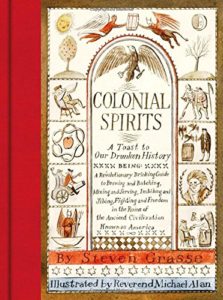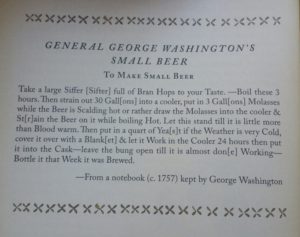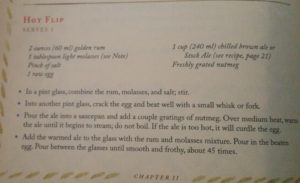I’m super excited to share the news that I’ll be giving THREE workshops at next year’s Historical Novel Society conference in Portland. I’m giving my popular History of Underthings workshop, co-presenting my Georgian and Victorian “kickshaws” workshop with Delilah Marvelle, and I’ll be giving the big Friday night kickoff workshop: Hooch Through History. If you want to join me, registration opens at the end of the month.
As soon as I’d hashed out the details of what they wanted for the Hooch workshop, I saw that Steven Grasse (booze god, creator of Sailor Jerry rum and Hendrick’s gin) was going to be talking about his book Colonial Spirits at a local bookshop. I immediately made plans to go, and I’m so glad I did. His talk was entertaining and informative, and the sample colonial cocktails were amazing.
Of course I bought the book (research!) and I’ve really been enjoying perusing it. How can you not love a book that’s intro includes: “These drinks may get you drunk. They may put hair on your chest. But they will not, we are proud to say with some measure of confidence, kill you.” Well ok then …
There’s a ton of interesting information in the book (both historical and anecdotal) as well as many recipes that I’m dying to try out! I’ve done a little brewing in my life, and I may have to put that experience (and a few friends and their brewing supplies) to work in the coming months.
I absolutely have to try out George Washington’s recipe for small beer. I know we’ve all read about small beer, and I’ve actually had it at reenactments, but I’ve never made it. In case anyone hasn’t heard of it, small beer (or small ale) is an ale with a low alcohol content that was commonly consumed by people the way we consume water today. I’ve always read that small ale was made by reusing the mash (so brew ale, then brew again, like reusing a tea bag). But George Washington and Grasse disagree. So this is going to have to be attempted.
Luckily, some of the recipes don’t require brewing and I had all the ingredients on hand. So there was immediate experimentation (in the name of science and history!). My first experiment is the Hop Flip. It’s a combination of rum, beer, molasses, and a raw egg. Flips go back to at least the 17thC. They began as beer, rum, and some kind of sweetener, heated with a hot poker (basically, it’s a type of hot punch, something to warm your bones on a cold, damp night).
I’m horrified to report that it’s not bad. Basically a lot like a hot, alcoholic egg cream. Not something that will be taking over from the Hot Toddy for me, but I’m not sorry I tried it and I’d totally make it again at an event.
Are there any historical drinks you wonder about as an author or a reader? Let me know in the comments and I’ll try to cover them in the upcoming months.




Ohhh! Talking about Delilah, when she hosted the Historical Romance Retreat this past month with Renee, they held an historical drinking session. We got to try drinking chocolate, Rum flip (similar or is the hop flip drink you mentioned), Jane Austin’s favorite Apple shrub, and Absinthe. They were interesting. The Absinthe is definitely a no, since Liquorice is not my flavor, but the apple shrub was okay, just lots of apple cider and apple vinegar, Rum flip was a no, and the Chocolate was perfection.
Ratafia has always been one that I wondered about. Google search it up but I’m still curious about it.
The problem with pinning down ratafia is that the term covered a plethora of things (all kinds and flavors of fruit-based alcohols and flavored waters). So there isn’t just one thing that you can point to and say, “THIS is ratafia!”
Like Ki Pha, I’ve wondered about ratafia, also negus. I wish I could go to those workshops you’re planning–hope you can do them again sometime!
Oh wow! They are so lucky to have you conduct those workshops! I hope they know that! I’ve enjoyed the workshops you presented at the Beau Monde Mini Conferences immeasurably. And the Hooch workshop sounds like a real winner! As others have said ratafia and negus would be good ones to nail down. And small beer answers a great many questions about how everyone drank beer all day and didn’t end up half seas over.